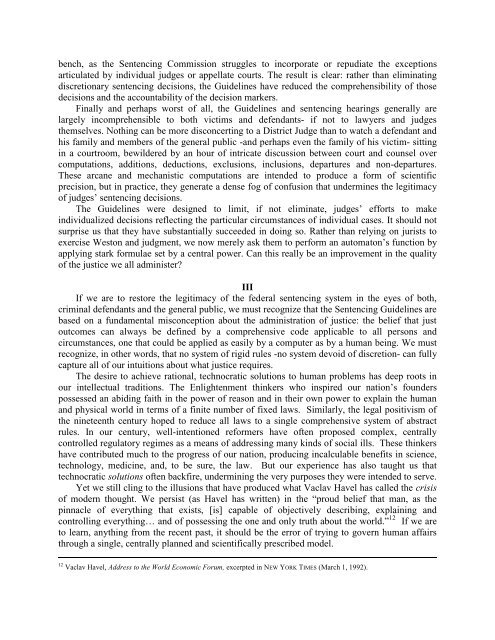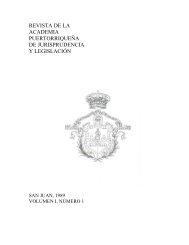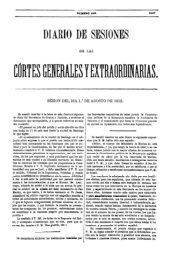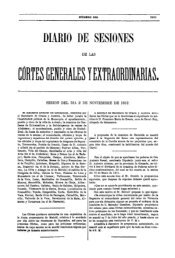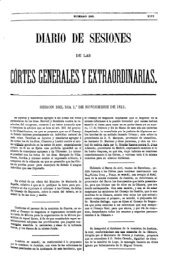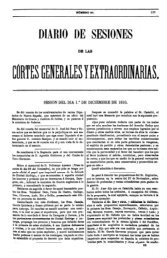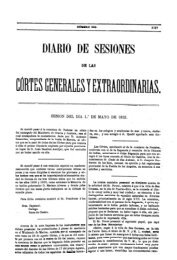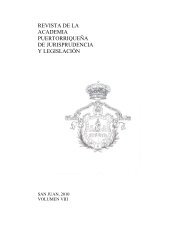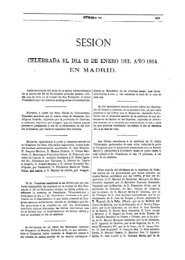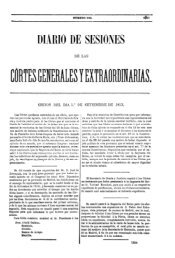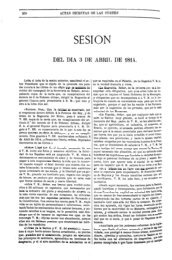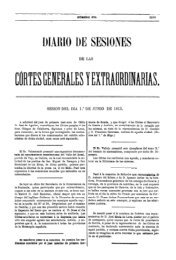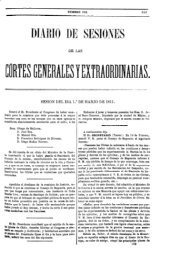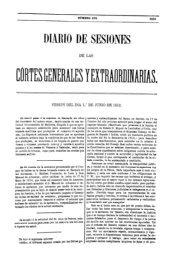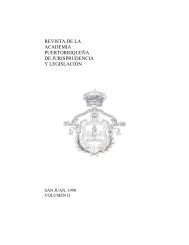narcotics and firearms, they tend to receive the most severe sentences meted out un<strong>de</strong>r theGui<strong>de</strong>lines system, which has been <strong>de</strong>signed to punish such offenses with special severity.In<strong>de</strong>ed, it appears that “<strong>de</strong>nying the judges the opportunity to mitigate sentences on the basis ofsocial disadvantage has worked against poor and minority <strong>de</strong>fendants.” 8 Today, I know of nofe<strong>de</strong>ral trial judge from a minority group who can be counted as a supporter of the Fe<strong>de</strong>ralGui<strong>de</strong>lines -while distinguished minority judges, such as Harry Edwards of the District ofColumbia Circuit, Nathaniel Jones of the Sixth Circuits, and Terry Hatter of the Central Districtof California, are in the forefront of the opposition. 9Moreover, the Gui<strong>de</strong>lines have not eliminated, or even severely constrained, the exercise ofdiscretion in sentencing <strong>de</strong>cisions. Instead, the Gui<strong>de</strong>lines have concealed and distorted thediscretionary <strong>de</strong>cisions that affect sentencing. Fe<strong>de</strong>ral prosecutors can dramatically affectsentencing outcomes by their <strong>de</strong>cisions about which charges to bring and what pleas to accept. 10Fe<strong>de</strong>ral probation officers, who have been called the guardians of the Gui<strong>de</strong>lines, possess broadpowers as fact-fin<strong>de</strong>rs and sentencing advisors. 11 The Sentencing Commission itself, of course,also possesses substantial discretion in <strong>de</strong>ciding the sentences applicable to particular categoriesof offenses and offen<strong>de</strong>rs. Finally -somewhat paradoxically- fe<strong>de</strong>ral trial judges themselvesretain substantial discretion over sentencing <strong>de</strong>cisions, <strong>de</strong>spite the presence of the Gui<strong>de</strong>lines, butthey are now permitted to exercise this discretion only by performing elaborate gyrations withinthe confines of the Gui<strong>de</strong>lines calculations. This element of judicial discretion within a purportedlymandatory system of rules produces a game of tug-or-war between the bureaucracy and the8Kate Stith and Steve Koh, The Politics of Sentencing Reform: The Legislative History of the Fe<strong>de</strong>ral Sentencing Gui<strong>de</strong>lines, 28WAKE FOREST L. REV. 223, 287 (1993) (emphasis in the original). See also, Charles J. Ogletree, The Death of Discretion?Reflections on the Fe<strong>de</strong>ral Sentencing Gui<strong>de</strong>lines, 101 HARV. L. REV. 1938 (1988) (noting that treating <strong>de</strong>privation as amitigating factor would lessen present racial disparities in sentencing).9See, e.q., U.S. v. Harrington, 947 F.2d 956 (D.C. Cir. 1991) (Edwards, J., concurring); Conference on the Fe<strong>de</strong>ral SentencingGui<strong>de</strong>line: Summary of Proceeding, 101 YALE L.J. 2053, 2071 (1992) (statement of Judge Jones, former General Counsel of theNAACP); ABC News Night line: Judges Protest mandatory Drug Sentences (ABC television broadcast, July 14, 1993) (remarksof Judge Hatter); and Judgment Calls; Ruling on Gays is in Keeping with Bold Stands, LOS ANGELES TIMES, February 6, 1993(Judge Hatter lamenting that the Sentencing Gui<strong>de</strong>lines have produced “particularly heinous results for young black and brownmales”). See also, Whither Thou Goest: Where Are the Fe<strong>de</strong>ral Sentencing Gui<strong>de</strong>lines Taking Us? (Speech by Chief JudgeManuel L. Real, United States District Court for the Central District of California) (On file with author).10See, e.q., Ilene H. Nagel and Stephen J. Schulhofer, A Tale of Three Cities: An Empirical Study of Charging andBargaining Practices Un<strong>de</strong>r the Fe<strong>de</strong>ral Sentencing Gui<strong>de</strong>lines, 66 S. CAL. L. REV. 501 (1992). Plea bargaining has traditionallyaccounted for 85 to 90 percent of fe<strong>de</strong>ral convictions. FCSC Report, 137. According to Nagel (a Sentencing Commissioner) andSchulhofer: “[I]n cases resolved through a guilty plea, the offenses of conviction that trigger the gui<strong>de</strong>line sentence exposure maybe <strong>de</strong>termined by plea bargaining, a process that is traditionally discretionary and unreviewed…To the extent that the offense forwhich the <strong>de</strong>fendant is convicted varies with the discretionary <strong>de</strong>cisions of individual prosecutors and the same offense conductdoes not always result in the same set of conviction charges, unwarranted disparity may be reintroduced into the fe<strong>de</strong>ral criminaljustice system.” Nagel and Schulhofer, supra at 502. They note that, while the sentencing gui<strong>de</strong>lines are generally followed evenin connection with plea-bargaining, and most fe<strong>de</strong>ral prosecutors have adopted basic procedures for reviewing plea agreements,“these procedures are more impressive on paper than in practice.” Id. at 544. As a result, “hid<strong>de</strong>n and unsystematic” gui<strong>de</strong>linecircumvention still occurs in many cases and is "an important obstacle to the success of the gui<strong>de</strong>lines effort. Both the frequencyand the extent of circumvention suggest significant divergence from the statutory purpose, as evi<strong>de</strong>nced by large guilty-pleadiscounts and substantial pockets of uncontrolled discretion.” Id at 557. They i<strong>de</strong>ntify drug-related criminal cases, in particular,as being ones in which "prosecutors exercise unfettered discretion in charging <strong>de</strong>cisions [and] the goals of certainty, uniformity,and the reduction of unwarranted disparity are at risk”. Id. at 561. As Judge Harry Edwards put it starkly in 1991, "the discretionand disparity game continues; it is only the players who have changed”. Harrington, 947 F.2d at 967 (Edwards, J., concurring).“with starker plea bargain choices and increases the criminal caseload of the courts. Since a <strong>de</strong>fendant Furthermore, to the extentthat prosecutors do follow the gui<strong>de</strong>lines in lockstep, the system bur<strong>de</strong>ns them "knows exactly what the sentencing range will bewhether or not he/she goes to trial…any incentive to plea has been eviscerated by the sentencing gui<strong>de</strong>lines”. FCSC Report, 142(additional statement of Judge Keep).11See, e.q., Harrington, 947 F.2 nd at 966 (Edwards, J., concurring) (“[e]normous potential power rests in his or her hands, for howthe Probation Officer chooses to characterize the <strong>de</strong>fendant may add years of confinement to a jail term”).
ench, as the Sentencing Commission struggles to incorporate or repudiate the exceptionsarticulated by individual judges or appellate courts. The result is clear: rather than eliminatingdiscretionary sentencing <strong>de</strong>cisions, the Gui<strong>de</strong>lines have reduced the comprehensibility of those<strong>de</strong>cisions and the accountability of the <strong>de</strong>cision markers.Finally and perhaps worst of all, the Gui<strong>de</strong>lines and sentencing hearings generally arelargely incomprehensible to both victims and <strong>de</strong>fendants- if not to lawyers and judgesthemselves. Nothing can be more disconcerting to a District Judge than to watch a <strong>de</strong>fendant andhis family and members of the general public -and perhaps even the family of his victim- sittingin a courtroom, bewil<strong>de</strong>red by an hour of intricate discussion between court and counsel overcomputations, additions, <strong>de</strong>ductions, exclusions, inclusions, <strong>de</strong>partures and non-<strong>de</strong>partures.These arcane and mechanistic computations are inten<strong>de</strong>d to produce a form of scientificprecision, but in practice, they generate a <strong>de</strong>nse fog of confusion that un<strong>de</strong>rmines the legitimacyof judges’ sentencing <strong>de</strong>cisions.The Gui<strong>de</strong>lines were <strong>de</strong>signed to limit, if not eliminate, judges’ efforts to makeindividualized <strong>de</strong>cisions reflecting the particular circumstances of individual cases. It should notsurprise us that they have substantially succee<strong>de</strong>d in doing so. Rather than relying on jurists toexercise Weston and judgment, we now merely ask them to perform an automaton’s function byapplying stark formulae set by a central power. Can this really be an improvement in the qualityof the justice we all administer?IIIIf we are to restore the legitimacy of the fe<strong>de</strong>ral sentencing system in the eyes of both,criminal <strong>de</strong>fendants and the general public, we must recognize that the Sentencing Gui<strong>de</strong>lines arebased on a fundamental misconception about the administration of justice: the belief that justoutcomes can always be <strong>de</strong>fined by a comprehensive co<strong>de</strong> applicable to all persons andcircumstances, one that could be applied as easily by a computer as by a human being. We mustrecognize, in other words, that no system of rigid rules -no system <strong>de</strong>void of discretion- can fullycapture all of our intuitions about what justice requires.The <strong>de</strong>sire to achieve rational, technocratic solutions to human problems has <strong>de</strong>ep roots inour intellectual traditions. The Enlightenment thinkers who inspired our nation’s foun<strong>de</strong>rspossessed an abiding faith in the power of reason and in their own power to explain the humanand physical world in terms of a finite number of fixed laws. Similarly, the legal positivism ofthe nineteenth century hoped to reduce all laws to a single comprehensive system of abstractrules. In our century, well-intentioned reformers have often proposed complex, centrallycontrolled regulatory regimes as a means of addressing many kinds of social ills. These thinkershave contributed much to the progress of our nation, producing incalculable benefits in science,technology, medicine, and, to be sure, the law. But our experience has also taught us thattechnocratic solutions often backfire, un<strong>de</strong>rmining the very purposes they were inten<strong>de</strong>d to serve.Yet we still cling to the illusions that have produced what Vaclav Havel has called the crisisof mo<strong>de</strong>rn thought. We persist (as Havel has written) in the “proud belief that man, as thepinnacle of everything that exists, [is] capable of objectively <strong>de</strong>scribing, explaining andcontrolling everything… and of possessing the one and only truth about the world.” 12 If we areto learn, anything from the recent past, it should be the error of trying to govern human affairsthrough a single, centrally planned and scientifically prescribed mo<strong>de</strong>l.12 Vaclav Havel, Address to the World Economic Forum, excerpted in NEW YORK TIMES (March 1, 1992).
- Page 1 and 2: REVISTA DE LA ACADEMIA PUERTORRIQUE
- Page 3: 2enardecerá, en vez de corregir, l
- Page 9 and 10: través de la Ley, enardecerá, en
- Page 11 and 12: MEDICINE AND BIOLOGY: HOW FAR CAN T
- Page 13: unfair, in view of the total absenc
- Page 16 and 17: CONTESTACIÓN AL DISCURSO DEL HON.
- Page 18 and 19: la Oficina de Política sobre Cienc
- Page 20 and 21: códigos de ética existentes y los
- Page 22 and 23: REFORMING THE FEDERAL SENTENCING GU
- Page 26 and 27: Our faith in technology and plannin
- Page 28 and 29: single, all-powerful judge”. 17 W
- Page 30 and 31: CONTESTACIÓN AL DISCURSO DEL HON.
- Page 32 and 33: 3trafficking and gun-related offens
- Page 34 and 35: 5conduct which experience has shown
- Page 36 and 37: 2En este escrito trataré de establ
- Page 38 and 39: 4atender sus obligaciones económic
- Page 40 and 41: 6B. Juicio Público: Al igual que e
- Page 42 and 43: 8explicar la doctrina vigente. 47 A
- Page 44 and 45: 10tan serio disturbio emocional (
- Page 46 and 47: 12En Soto Ramos v. Superintendente
- Page 48 and 49: 14profesional y cómo ésta podría
- Page 50 and 51: 16Las implicaciones de esta exigenc
- Page 52 and 53: 18jurado. 116 Por otro lado, nuestr
- Page 54 and 55: 20forma rigurosa, de que la renunci
- Page 56 and 57: 22Tribunal Supremo ha seguido celos
- Page 58 and 59: 24protección es mayor que la que e
- Page 60 and 61: 264. Absuelto un acusado por determ
- Page 62 and 63: 28En Puerto Rico sólo cabe regular
- Page 64 and 65: 30B. Aplicación ex post facto de l
- Page 66 and 67: 32relación con el alcance 224 de l
- Page 68 and 69: 34se trata de una norma que comenz
- Page 70 and 71: 364) que la corroboración se relac
- Page 72 and 73: 38arresto. Bajo la Enmienda Cuarta,
- Page 74 and 75:
40razonable a la intimidad, no hay
- Page 76 and 77:
42Nuestra legislación permite la d
- Page 78 and 79:
44Derechos se dispone expresamente
- Page 80 and 81:
46Estados Unidos, adopta una posici
- Page 82 and 83:
2Aclarados esos puntos, coincido co
- Page 84 and 85:
La verdad es que los principios con
- Page 86 and 87:
EL DOLOR Y LA ANGUSTIA MENTALRamón
- Page 88 and 89:
3.7 8 9 10conocida y aceptada, hast
- Page 90 and 91:
5estímulo. Sin embargo, el punto e
- Page 92 and 93:
7de reconocimiento mundial, como ex
- Page 94 and 95:
dice que éste no distingue entre e
- Page 96 and 97:
11dos meses y medio más tarde cuan
- Page 98 and 99:
implicaciones negativas. Se debe de
- Page 100 and 101:
2naturaleza de los seres vivos, apl
- Page 102 and 103:
4de la clase dominante en la socied
- Page 104 and 105:
6su hora admitió ser identificado
- Page 106 and 107:
8cumpla la prestación que la norma
- Page 108 and 109:
10Encontramos la expresión todaví
- Page 110 and 111:
12La satisfacción de necesidades h
- Page 112 and 113:
14como aquí se propone, puede hace
- Page 114 and 115:
LOS DERECHOS HUMANOS FRENTE AL ESTA
- Page 116 and 117:
Como resultado, se ha llegado a un
- Page 118 and 119:
Yugoslavia, Georgia, Azerbaiján, A
- Page 120 and 121:
METASTESIS DE LA «RAZÓN» Y EL «
- Page 122 and 123:
fue quizás el producto de esa mism
- Page 124 and 125:
embargo, la corroboración de la ne
- Page 126 and 127:
VICuando Hegel, en su Phänomenolog
- Page 128 and 129:
del entendimiento (Verstehen) en el
- Page 130 and 131:
por el poder, por las estructuras y
- Page 132 and 133:
lo único que indica esta trasgresi
- Page 134 and 135:
Legislativa enmendó la Ley 53 orig
- Page 136 and 137:
Incluso, únicamente ofreció su t
- Page 138 and 139:
Al llegar a la gobernación en 1965
- Page 140 and 141:
Presidente del Tribunal Supremo y a
- Page 142 and 143:
Lamentablemente, vivimos en una soc
- Page 144 and 145:
1. El que en todas las acciones rel
- Page 146 and 147:
coordinación interagencial, con pa


